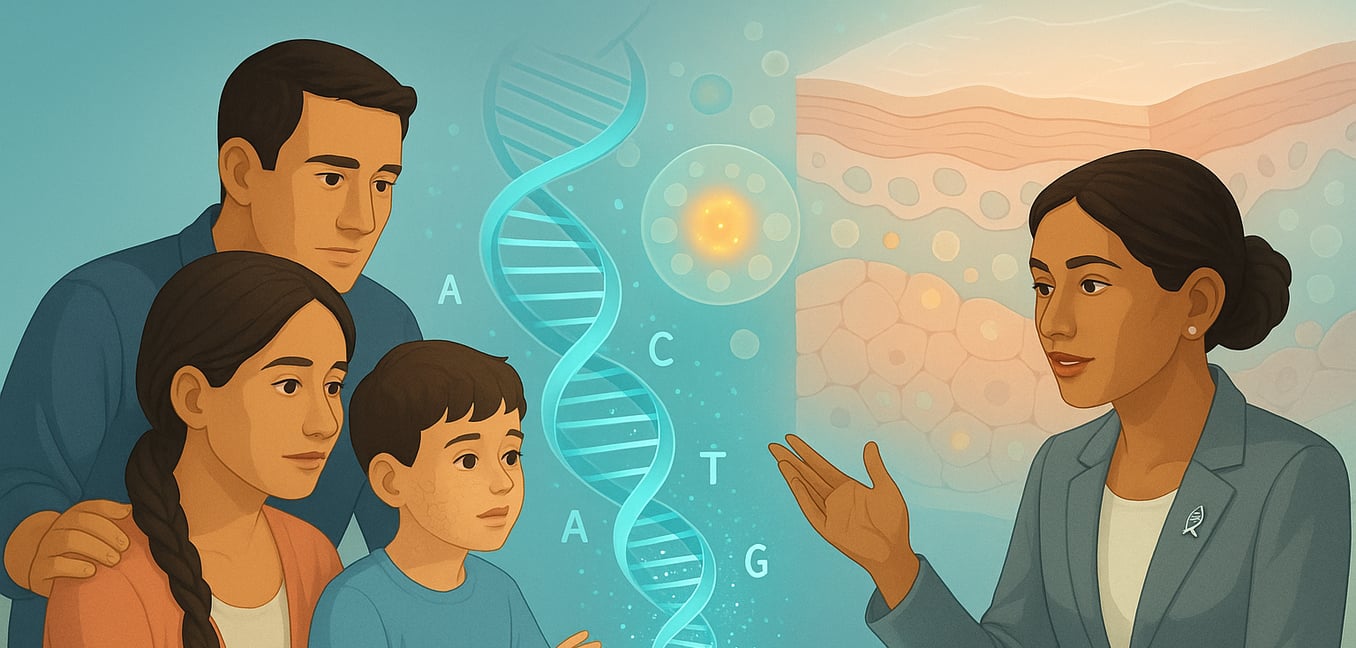The Genetic Counselor's Role in Navigating Recessive X-Linked Ichthyosis
Recessive X-linked ichthyosis (RXLI) is a genetic skin condition that primarily affects males, causing a buildup of dark, persistent scales. It results from a deficiency in the steroid sulfatase (STS) enzyme, which is crucial for normal skin shedding. While the skin symptoms are most visible, RXLI can also be linked to other health considerations, making a diagnosis a complex and emotional journey for families.
This is where a genetic counselor becomes an indispensable guide. Their role extends far beyond explaining a test result; they help families understand the diagnosis, navigate the genetic implications for the entire family, and make informed decisions about their future. A genetic counselor acts as an interpreter, an advocate, and a supportive partner, translating complex medical information into a practical roadmap for managing the condition.
Guiding Families Through the Diagnostic Process
A diagnosis often begins with observing the characteristic "fish-scale" skin pattern, but symptoms in early infancy can overlap with other forms of ichthyosis. A genetic counselor helps families move from uncertainty to a definitive answer by explaining the value and process of molecular testing.
Confirming the Diagnosis In the neonatal period, it can be difficult to distinguish RXLI from other skin conditions based on appearance alone. A genetic counselor will explain how molecular testing, such as a next-generation sequencing panel, can pinpoint the exact cause. By analyzing the STS gene, these tests provide a conclusive diagnosis, which is the foundation for creating an accurate long-term management plan and predicting the condition's course.
Identifying At-Risk Relatives Since RXLI is an X-linked condition, female relatives are often carriers without showing any significant symptoms. A genetic counselor facilitates carrier testing for mothers, sisters, and aunts. This information, which a physical exam cannot reveal, empowers these women to understand their own health—including potential risks during childbirth due to placental sulfatase deficiency—and make informed choices about their own family planning.
Anticipating Associated Health Issues Sometimes, RXLI is caused by a large deletion of DNA that removes the STS gene and its neighbors. A genetic counselor explains how advanced genetic analysis can determine the size of this deletion. This provides critical clues about whether an individual is at higher risk for related conditions like undescended testicles (cryptorchidism) or attention deficit and hyperactivity disorder (ADHD). This knowledge allows the healthcare team to shift from a reactive to a proactive approach, implementing early screening and intervention for potential non-skin-related challenges.
Translating Genetics: Explaining How RXLI is Inherited
Once a diagnosis is confirmed, one of the most important roles for a genetic counselor is to demystify the inheritance pattern. They translate the science of X-linked genetics into a clear picture of what it means for a family, addressing the common question: "What are the chances for our future children?"
The counselor breaks down the transmission risks into clear, understandable scenarios:
- When the mother is a carrier: The counselor explains that for each pregnancy, there is a 50% chance of having an affected son and a 50% chance of having a carrier daughter. They emphasize that these are independent probabilities for each child.
- When the father has RXLI: The counselor clarifies that all of his daughters will be carriers, while none of his sons will be affected or inherit the condition from him. This is vital information for his daughters as they plan for their own futures.
- Why males are primarily affected: The counselor illustrates how having only one X chromosome (XY) means males lack a "backup" copy of the STS gene. If their single X chromosome carries the mutation, they will develop the condition. Females (XX), in contrast, usually have a second, healthy copy that compensates, making them unaffected carriers.
Navigating Personal Risk and Making Informed Choices
Understanding the statistics is one thing; processing what they mean for your family is another. A genetic counselor provides a supportive, non-directive space for families to explore their feelings and decide on a path forward.
Framing Risk in a Personal Context A 50% chance can feel like a coin toss, but its emotional weight varies immensely. A genetic counselor helps families move beyond the abstract percentage to explore the tangible realities of raising a child with RXLI. This involves discussing the day-to-day skin care, the potential for associated conditions like ADHD, and how the family’s existing support systems and values might shape their experience. By personalizing the risk, counselors empower families to make decisions that reflect their own hopes and capabilities.
Addressing the Concept of 'Burden' and Quality of Life The perception of a condition’s severity is highly subjective. The counselor facilitates an open conversation about what quality of life means to the family, helping them weigh the potential challenges against the profound desire for a child. For some, the daily routines may feel overwhelming, while others may view it as a manageable part of life. This discussion ensures that decisions are rooted in the family’s unique perspective, not an external definition of risk.
Exploring Reproductive Options After processing the personal meaning of the risk, families need clear, unbiased information about their available paths. A genetic counselor carefully outlines all reproductive options, explaining the procedures, potential outcomes, and accessibility of each choice so the family can make an informed decision that aligns with their personal, ethical, and financial circumstances.
Supporting Family Planning and Reproductive Decisions
For families ready to move forward, a genetic counselor illuminates the pathway of available reproductive technologies and diagnostic tools. This guidance transforms abstract risks into concrete choices, empowering couples to choose a path that aligns with their goals.
Prenatal Screening Clues During pregnancy, routine maternal serum screening can offer early hints. A counselor may explain that unusually low levels of a hormone called unconjugated estriol can be a strong clue. Because the placenta needs the STS enzyme to produce this hormone, low levels in the mother's blood can indicate that a male fetus has RXLI. This finding is not a diagnosis, but it serves as a critical flag that prompts a more focused conversation about definitive testing.
Definitive Prenatal Diagnosis For families seeking certainty during a pregnancy, a genetic counselor will discuss options like chorionic villus sampling (CVS) or amniocentesis. These procedures analyze the fetus’s DNA directly for the family’s specific STS mutation, providing a clear "yes" or "no" answer. This certainty allows parents to prepare for their child’s specific needs, connect with support resources, or make other deeply personal decisions about the pregnancy.
Pre-implantation Genetic Diagnosis (PGD) As an alternative for couples using in-vitro fertilization (IVF), the counselor can explain PGD. In this process, embryos are tested for the RXLI-causing mutation before being transferred to the uterus. This allows the couple to select an unaffected embryo for implantation, giving them a high degree of control over their reproductive journey. The counselor helps the family navigate the financial, ethical, and logistical considerations of this advanced option.










